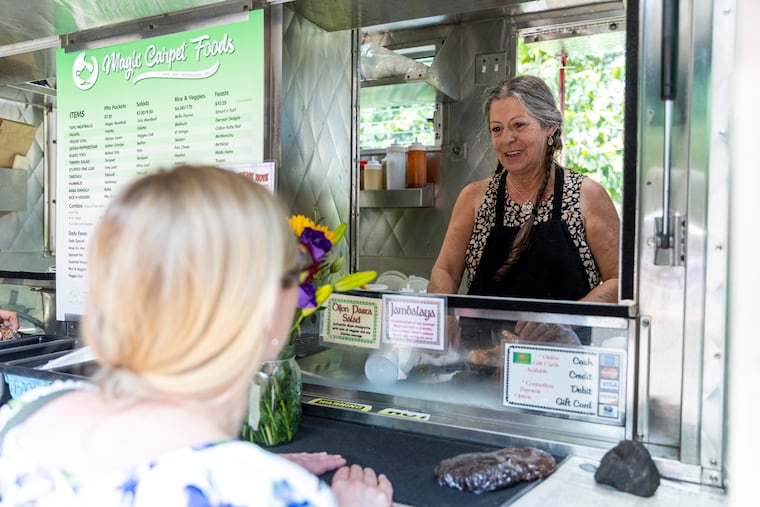Goodbye to Magic Carpet, the vegetarian food truck that powered generations of UPenn students
After almost 40 years in business, the vegetarian and vegan food truck Magic Carpet is shutting down. UPenn students past and present will miss it.

It’s dinnertime in Philadelphia, and Deb Varvoutis is too tired to cook. She’s been on her feet all day, serving falafel salads and veggie chili out of her food cart at 34th and Walnut. Amidst food trucks that have come and gone in University City, Deb and her husband, Dean, have remained staples since they opened Magic Carpet Foods in 1984. Thirty-nine years later, the Varvoutises are 64 and set to close their beloved business, but the community they’ve fed for nearly four decades is far from ready to say goodbye.
“I’m devastated,” says Douglas Jerolmack, a geophysics professor at Penn, while waiting in line to order. “I’m coming here every day until they leave.” Jerolmack, a vegetarian, started working at Penn 16 years ago. Magic Carpet was the only place he could count on for healthy, affordable, plant-based food.
The food and the prices have always attracted people to Magic Carpet, but Deb and Dean are what keep customers coming back. The Varvoutises are warm and kind; they remember your face and your order. “In a world full of Sweetgreens and Cavas, it’s nice to have that family vibe, especially in a place that can be as isolating as Penn,” says Alexandra Sternlicht, class of 2016.
Back in the ‘80s, Magic Carpet was a pioneer for vegetarianism in the city. “When we first started, nobody knew what a falafel was,” Deb Varvoutis says. “And the tofu meatballs, people would snub their nose and I’d be like, here, taste one.” Sternlicht credits those meatballs with getting her through college. “That was what was pumping through my veins,” she says. “I think I had them at least once a day.”
While Magic Carpet has become a safe haven for vegetarians and vegans, Varvoutis estimates that only a quarter of their customers follow a meatless diet. For Jamie-Lee Josselyn, class of 2005 and now an instructor in the school’s creative writing program, Magic Carpet was a first foray into vegetarian cuisine. “I consider Magic Carpet part of my Penn education,” Josselyn says. “It taught me how to eat without meat being at the center of the meal.” To this day, Josselyn models some of her own cooking off food she has eaten at Magic Carpet.
From feta-stuffed vine leaves to spinach tofu lasagna, Magic Carpet’s food balances health and comfort. And then there are the cookies, with their crunchy edges and cult following. The flavors change daily, but there’s always a mix of oats, fruit, chocolate, and nuts, whether that’s raspberry coconut chocolate chip or peanut butter blueberry. Varvoutis’ son, Aaron, who runs the second Magic Carpet cart at 36th and Spruce, posts the flavors on Instagram each day. He usually receives messages from students in class asking him to set a cookie aside before they sell out.
Gabby Abramowitz, class of 2016, bonded over a shared love of the cookies with her younger brother, who went to Penn five years later. “He would come back for Thanksgiving and always bring me one,” she says. Alaina Chou, class of 2022, loved the cookies so much that she tried to recreate them at home, but has had trouble getting the texture right. Chou isn’t the only one; Varvoutis has customers begging her for recipes. “I had more than one person say, ‘I’ll sign a waiver,’ ” she says.
For now, the couple is keeping the recipes to themselves in hopes that they can sell them along with the equipment and the brand itself. The dream buyer? Someone with ties to Penn who will honor Magic Carpet’s legacy, keep a foundation in Philly, and expand the brand. “I believe with all my heart that we can compete with any of the vegetarian places out there,” Varvoutis says. The Varvoutises are wary of buyers who might cut corners with lower quality products, and if they end up selling, they’d like the menu to stay the same. It hasn’t ever changed, and that consistency is part of what makes Magic Carpet so special.
To outsiders, Magic Carpet might look like any other food cart, but to loyalists, it’s so much more than a place to grab lunch. Just ask Caroline Rothstein, class of 2006, who says Magic Carpet helped her recover from an eating disorder. “I would go there three to four times a week, and I was able to reclaim an understanding that food could be joyful,” Rothstein says. “Eating Magic Carpet food was nourishing not just my body, but my soul.”
For Chase Harrow, class of 2015, the idea of never again getting to eat the baked tofu is, in his words, “a little existential.” “The fact that I have such a strong love for Magic Carpet when the community of food trucks in University City is so strong,” Harrow says, “that goes to show you how good it is.”
Sri Narayanamoorthy, a rising senior at Wharton, wonders what eating on campus will look like without Magic Carpet. She goes to the cart every Wednesday with her friends, and has found that Magic Carpet offers meals that are cheaper, more nutritious, and far more delicious than anything in the dining halls. Narayanamoorthy says, “Losing that option worries me a little bit.”
To all of the fans throughout the years, Deb and Dean say thank you. “It’s definitely bittersweet,” Varvoutis says, “but it’s time.” Operating these two carts has been a daily hustle, and the couple is ready to slow down. And although they’re hoping this isn’t so much goodbye as see you later, the magic they’ve brought to Penn’s campus will be missed.